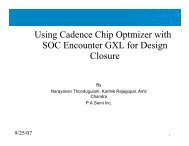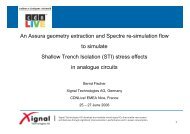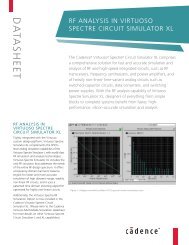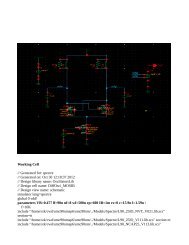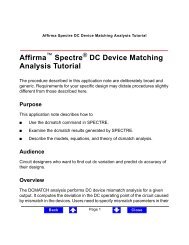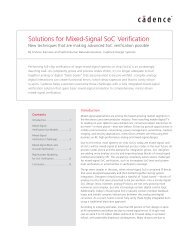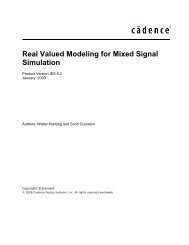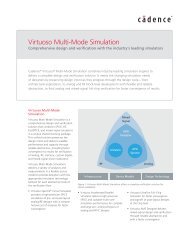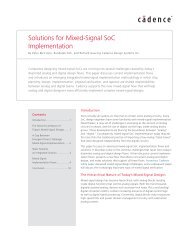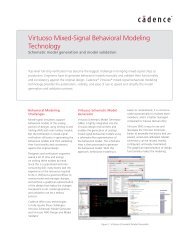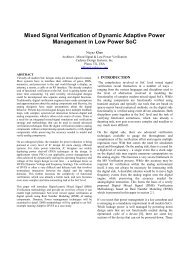Samsung and Cadence - Cadence Design Systems
Samsung and Cadence - Cadence Design Systems
Samsung and Cadence - Cadence Design Systems
Create successful ePaper yourself
Turn your PDF publications into a flip-book with our unique Google optimized e-Paper software.
<strong>Samsung</strong> <strong>and</strong> <strong>Cadence</strong><br />
“As <strong>Cadence</strong> promised, our validation environment now runs hundreds of times faster than with simulation.<br />
Accelerated VIP running on the Palladium XP increased my team’s productivity by 100%. It also enabled us to<br />
find bugs we were unable to reach using simulation.”<br />
Tony Gladvin George, Verification Engineer, <strong>Samsung</strong><br />
The Customer<br />
<strong>Samsung</strong> is a market share leader in solid-state drives (SSDs).<br />
The SSD is an innovative, nonvolatile storage medium,<br />
commonly used in laptops <strong>and</strong> servers in place of a rotating<br />
hard disk drive (HDD). This saves on power, space, <strong>and</strong> cost<br />
while simultaneously increasing product reliability. Because of<br />
these advantages, SSDs are being employed more <strong>and</strong> more in<br />
mobile devices such as tablets <strong>and</strong> smartphones.<br />
In early 2012, <strong>Samsung</strong> decided to add a PCI Express interface<br />
to its SSD controllers to increase the data transfer performance.<br />
<strong>Samsung</strong> expects this innovation to exp<strong>and</strong> market share <strong>and</strong> to<br />
address additional OEM markets.<br />
The Challenge<br />
Traditionally, SSDs have been based on the 12-year-old SATA<br />
protocol used for HDDs. This was a good choice for software<br />
<strong>and</strong> hardware compatibility, but it has shortcomings for<br />
performance <strong>and</strong> throughput when used with non-volatile<br />
memory (as opposed to use with a spinning hard drive). Using<br />
PCI Express as the interface, the SSD storage can be directly<br />
attached to the PCI Express bus in the end product. This enables<br />
much higher transaction rates <strong>and</strong> lower latencies relative to<br />
SATA-based SSDs.<br />
However, the addition of PCI Express to <strong>Samsung</strong>’s SSD significantly<br />
increased the challenges faced in device <strong>and</strong> software validation,<br />
particularly at the system-on-chip (SoC) level. Adding PCI Express<br />
would require a significant performance increase in the validation<br />
environment. This performance is needed to:<br />
• Validate PCI Express behavior at the SoC level<br />
• Integrate <strong>and</strong> debug host driver software<br />
• Validate end-to-end end bulk DMA transfers<br />
Business Challenges<br />
• Deliver new SSD products to market<br />
on time<br />
• Exp<strong>and</strong> market share <strong>and</strong> grow into<br />
new applications<br />
<strong>Design</strong> Challenges<br />
• Complete verification efficiently for new<br />
SSD products<br />
• Enable early firmware <strong>and</strong> driver<br />
integration, <strong>and</strong> debug, prior to FPGA<br />
prototype availability<br />
<strong>Cadence</strong> Solutions<br />
• Palladium XP with simulation acceleration<br />
use model<br />
• Accelerated VIP for PCI Express<br />
Results<br />
• Increased validation speed multiple<br />
hundreds of times compared to simulation<br />
• Increased validation team productivity<br />
by 100%
SSD validation at <strong>Samsung</strong> involves ensuring the SoC’s proper<br />
functioning within a wide variety of usage scenarios as well as<br />
integrating <strong>and</strong> debugging firmware <strong>and</strong> device drivers. <strong>Samsung</strong><br />
initially attempted to use their traditional approach—a simulated<br />
testbench using simulation verification IP (VIP). They quickly<br />
found this to be much too slow <strong>and</strong> inefficient for their needs<br />
with the PCI Express interface.<br />
“The main problem in SSD validation is the need to validate a<br />
huge amount of data moving between the host to the Flash<br />
memory devices <strong>and</strong> vice versa,” explains Tony Gladvin George,<br />
a <strong>Samsung</strong> verification engineer. “Unfortunately in our simulated<br />
verification environment, this takes far too much time.”<br />
<strong>Samsung</strong> determined that they needed greater testbench<br />
performance—much greater. “We needed performance on<br />
tthe order of hundreds of times faster than what we were<br />
achieving using simulation,” says Mr. George.<br />
The Solution<br />
Accelerated validation was essential to achieving the required<br />
performance <strong>and</strong> developing the new product on time. <strong>Samsung</strong><br />
turned to <strong>Cadence</strong> to provide a PCI Express SSD validation<br />
environment that would meet their performance requirements<br />
<strong>and</strong> enable the range of validation capabilities required. <strong>Cadence</strong><br />
recommended its Palladium ® XP-based validation environment<br />
using the simulation acceleration use model together with<br />
Accelerated VIP (AVIP) for PCI Express. This new environment fit<br />
in well with <strong>Samsung</strong>’s existing one, which included simulation<br />
<strong>and</strong> FPGA prototype boards. Acceleration with AVIP provides the<br />
level of control <strong>and</strong> observability available with simulation, but it<br />
runs hundreds of times faster <strong>and</strong> is available months ahead of an<br />
FPGA-based platform.<br />
Within three weeks the accelerated validation environment<br />
including the PCI Express AVIP was up <strong>and</strong> running. “As <strong>Cadence</strong><br />
promised, our validation environment now runs hundreds of<br />
times faster than with simulation,” Mr. George explains. “AVIP<br />
running on the Palladium XP increased my team’s productivity<br />
by 100% due to the reduced waiting time between simulations.<br />
It also enabled us to find bugs we were unable to reach using<br />
simulation.”<br />
Summary <strong>and</strong> Future Plans<br />
<strong>Samsung</strong>’s new PCI Express-based SSD needed hundreds of<br />
times greater performance than their simulation environment<br />
could provide. Using <strong>Cadence</strong> PCI Express AVIP running on the<br />
Palladium XP platform, <strong>Samsung</strong> was able to close this gap <strong>and</strong><br />
reach the speed <strong>and</strong> productivity goals they had established for<br />
SSD validation.<br />
Given its effectiveness, the <strong>Cadence</strong> solution will be deployed on<br />
future projects as well. “We are very happy with the support <strong>and</strong><br />
responsiveness that <strong>Cadence</strong> has provided” summarizes Taehak<br />
Lee, a <strong>Samsung</strong> verification manager. “Looking to the future,<br />
the Palladium-based validation environment with AVIP can now<br />
be ported to any of our upcoming PCI Express-based SSDs with<br />
minimal effort.”<br />
<strong>Cadence</strong> is transforming the global electronics industry through a vision called EDA360.<br />
With an application-driven approach to design, our software, hardware, IP, <strong>and</strong> services help<br />
customers realize silicon, SoCs, <strong>and</strong> complete systems efficiently <strong>and</strong> profitably. www.cadence.com<br />
© 2012 <strong>Cadence</strong> <strong>Design</strong> <strong>Systems</strong>, Inc. All rights reserved. <strong>Cadence</strong>, the <strong>Cadence</strong> logo, <strong>and</strong> Palladium are registered trademarks of <strong>Cadence</strong> <strong>Design</strong><br />
<strong>Systems</strong>, Inc. All others are properties of their respective holders. 22994 09/12 MK/LX/PDF





